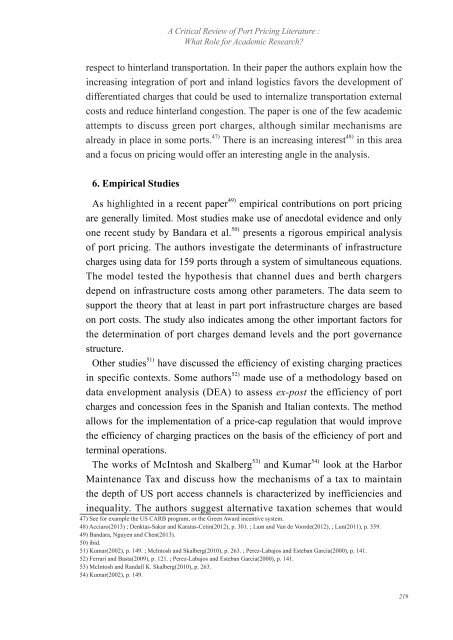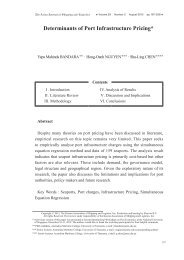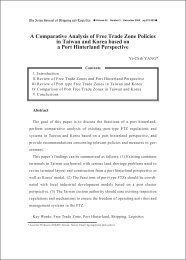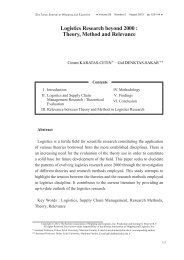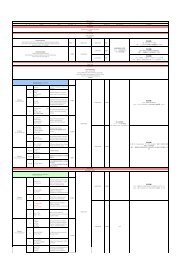A Critical Review of Port Pricing Literature : What Role for ... - Ajsl.info
A Critical Review of Port Pricing Literature : What Role for ... - Ajsl.info
A Critical Review of Port Pricing Literature : What Role for ... - Ajsl.info
Create successful ePaper yourself
Turn your PDF publications into a flip-book with our unique Google optimized e-Paper software.
A <strong>Critical</strong> <strong>Review</strong> <strong>of</strong> <strong>Port</strong> <strong>Pricing</strong> <strong>Literature</strong> :<strong>What</strong> <strong>Role</strong> <strong>for</strong> Academic Research?respect to hinterland transportation. In their paper the authors explain how theincreasing integration <strong>of</strong> port and inland logistics favors the development <strong>of</strong>differentiated charges that could be used to internalize transportation externalcosts and reduce hinterland congestion. The paper is one <strong>of</strong> the few academicattempts to discuss green port charges, although similar mechanisms arealready in place in some ports. 47) There is an increasing interest 48) in this areaand a focus on pricing would <strong>of</strong>fer an interesting angle in the analysis.6. Empirical StudiesAs highlighted in a recent paper 49) empirical contributions on port pricingare generally limited. Most studies make use <strong>of</strong> anecdotal evidence and onlyone recent study by Bandara et al. 50) presents a rigorous empirical analysis<strong>of</strong> port pricing. The authors investigate the determinants <strong>of</strong> infrastructurecharges using data <strong>for</strong> 159 ports through a system <strong>of</strong> simultaneous equations.The model tested the hypothesis that channel dues and berth chargersdepend on infrastructure costs among other parameters. The data seem tosupport the theory that at least in part port infrastructure charges are basedon port costs. The study also indicates among the other important factors <strong>for</strong>the determination <strong>of</strong> port charges demand levels and the port governancestructure.Other studies 51) have discussed the efficiency <strong>of</strong> existing charging practicesin specific contexts. Some authors 52) made use <strong>of</strong> a methodology based ondata envelopment analysis (DEA) to assess ex-post the efficiency <strong>of</strong> portcharges and concession fees in the Spanish and Italian contexts. The methodallows <strong>for</strong> the implementation <strong>of</strong> a price-cap regulation that would improvethe efficiency <strong>of</strong> charging practices on the basis <strong>of</strong> the efficiency <strong>of</strong> port andterminal operations.The works <strong>of</strong> McIntosh and Skalberg 53) and Kumar 54) look at the HarborMaintenance Tax and discuss how the mechanisms <strong>of</strong> a tax to maintainthe depth <strong>of</strong> US port access channels is characterized by inefficiencies andinequality. The authors suggest alternative taxation schemes that would47) See <strong>for</strong> example the US CARB program, or the Green Award incentive system.48) Acciaro(2013) ; Denktas-Sakar and Karatas-Cetin(2012), p. 301. ; Lam and Van de Voorde(2012), ; Lun(2011), p. 559.49) Bandara, Nguyen and Chen(2013).50) ibid.51) Kumar(2002), p. 149. ; McIntosh and Skalberg(2010), p. 263. ; Perez-Labajos and Esteban Garcia(2000), p. 141.52) Ferrari and Basta(2009), p. 121. ; Perez-Labajos and Esteban Garcia(2000), p. 141.53) McIntosh and Randall K. Skalberg(2010), p. 263.54) Kumar(2002), p. 149.219


